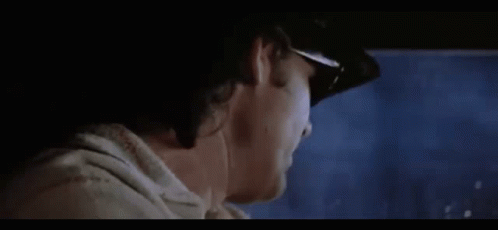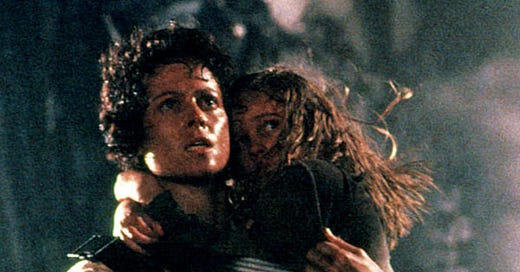Problematic Badass Female Tropes #5
Mother Knows Best
The little girl’s name is Rebecca but she prefers the nickname Newt. Ripley, though not the only woman on the crew, is yet the only one who regards Newt as anything more than an annoyance. She’s become rather attached to the kid. She enjoyed the warm feeling she got when she tucked Newt into bed, reassuring her that she would be watching over her. And when the rest of them want to leave Newt behind for dead, Ripley is the only one who goes after her, to save her. After everything Ripley has been through in her first story (Alien), in her sequel (Aliens), this is one thing she will finish right.
And so, when the slimy queen alien corners terrified little Newt, Ripley acquires the superhuman strength of mothers protecting their children. Except Ripley gets hers not by magic, or by sheer force of will, but by strapping herself into a heavy mech suit, strong enough to attack the giant xenomorph. Striding up to the snarling, slimy, insectoid queen, putting her mechanized body between the monster and the little girl, Ripley growls, “Get away from her, you bitch!”
Welcome to Trope #5 of the Problematic Badass Female Tropes series: Mother Knows Best. This trope centers around motherhood as a form of redemption for the female badass, or, in other words: motherhood as the only goal for her; the only possible happy ending.
Take, for example, Kill Bill, in which the Bride (name of Beatrix Kiddo) finds resolution and redemption in her reunion with her daughter. Her action-hero plot of blood and guts doesn’t end with her riding off into the sunset to continue her badassery. Nope. (Actually, can you imagine Tarantino creating an ending like that? Oh hell no—that’d allow this female badass protagonist too much power.) No, the Bride’s redemption only comes when she is once again a mother, and motherhood is her only redemptive option.
Similarly, in The Hunger Games series, Katniss Everdeen is also a violent badass, not only due to her harsh early life in poverty-stricken District 12 and continued ‘success’ as a deadly gladiator in the Hunger Games, but mostly for her ruthless takedown of her world’s oppressive government. And what happens to this ultimate badass female protagonist who undid, nearly single-handedly, a horrific regime that bombs children and holds a whole continent enslaved? Does she become president or a leader of any kind? Does she continue her fight to keep her people safe (as she did throughout all three novels)? Nope. She marries her gentle baker friend from childhood and has babies. Her happy ending doesn’t involve continuing her life as a revolutionary fighter and political leader, but tending to her garden patch at her little house with her husband and children. Well, sure, you might be saying, but isn’t that a peaceful, happy, well deserved denouement for her life, after all the PTSD-inducing violence she has survived till then? Maybe, but this ending, for a female badass in particular, is problematic.
Why?
Because a female character isn’t allowed to ride off into the sunset as a lone hero. It just can’t happen, not in this pop culture landscape. The only happy ending and the only redemption available to a female (especially a ruthlessly bloody) badass is to become a mother. This of course means that she is perforce subjugated to the patriarchal rule of the nuclear family myth, negating her badassness, and becoming domesticated in every sense of the word.
Not true for men; the common redemptive ending for bloody and badass male characters is the very opposite—often they leave wife, girlfriend, child behind and resume their adventures solo. From James Bond to Jack Burton to Mad Max, they may have a woman and/or a kid to protect during their main story, but the male hero’s happy ending does not include them. Or, like serial hero Patrick Jane from TV series The Mentalist, the fatherhood bit is fridged early, so that his dead wife and child become, Arwen-syndrome-like, the absent inspiration for his actions, but not a real presence in his life.
The man with fatherhood slung about his shoulders like an albatross is not a hero with a happy ending; he’s either tied down (so no longer a hero), or a joke (the problematic male trope of the bumbling dad). The badass male hero ends his story as just that: a legend told by those he has left behind (like Max in Road Warrior). And often, as western legends Shane and The Man With No Name do, he’ll move on to continue his heroics elsewhere, alone.

The female badass that tends to succumb to the Mother Knows Best trope is either ruthless and extremely violent in nature (see any fight scene from Kill Bill volumes 1 & 2), or stereotypically masculine in behavior. Sometimes both. (Fun Fact: Ripley was written originally as a male character.) The powerful (especially the scary, bloodbath-inducing, Kali-like maniac) female badass is tempered by this trope, rendered more handleable and ‘ladylike’ by their domestication. Mother Knows Best is the epitome of “get in the kitchen and make me a sandwich.”
The Mother Knows Best trope gives female characters only one happy ending—one way to achieve redemption—and that’s in motherhood. If she can’t (or God forbid) chooses not to be a mother, she is portrayed as some kind of freak, and never redeemed for the violence of her badassery (see the controversy over Marvel’s Black Widow calling herself a monster for not being able to have children as an example).
Male characters never have to worry about this: John Wick may be spurred on by memories of his dead wife, but becoming a family man at the end of his bloody, guns-a-blazing story isn’t his happy ending at all. Quite the opposite—by the end of his second movie, he’s even alienated the ‘family’ of his organization. Not so for equally badass fighter Beatrix Kiddo: she ends her story with her daughter in tow (and in fact finding and fetching her child was the final goal for all her bloody fighting, as it turns out). And there’s no such thing as a female Lone Wolf and Cub, no woman Mandalorian and Grogu: once the female badass is Mom, her adventures come to an end.
How does this trope do its damage? By propagating, through ‘strong’ female characters, the tired stereotype that women must all be nurturers (also that men are not). That no matter how powerful a woman may be in the world, her role as a woman will always be at home with the children.
In real life, we see badass mothers all around us, combining their badassery with their motherhood in superhuman ways. We see men embrace the nurturing nature of fatherhood heroically without losing an ounce of their masculinity. So why aren’t we seeing these in our entertainment and our literature? The Hunger Games, after all, is a YA series, and a very popular one. As such, these tropes are highly influential to the developing minds that consume and attempt to emulate them. What does it teach young people that motherhood is depicted as the only redemption and the only happy ending available to a female badass?
And of course, as usual with this series, I’m not suggesting you start hating your beloved literature and cinema and games, but rather encouraging you to become more aware of the systematic misogyny inherent in even the baddest of asses you enjoy, to call these tropes out, and patronize (and therefore perpetuate) those few—those happy few—who are at least attempting to rise above. And remember, everything we enjoy and infuse into our culture entertainment-wise affects real badass women in their real daily lives. The more we can recognize this, the better chance it has to change.






I feel like Angelina Jolie has a few movies in which she plays an action hero who is distinctly not maternal (_Mr & Mrs. Smith_, _Salt_)